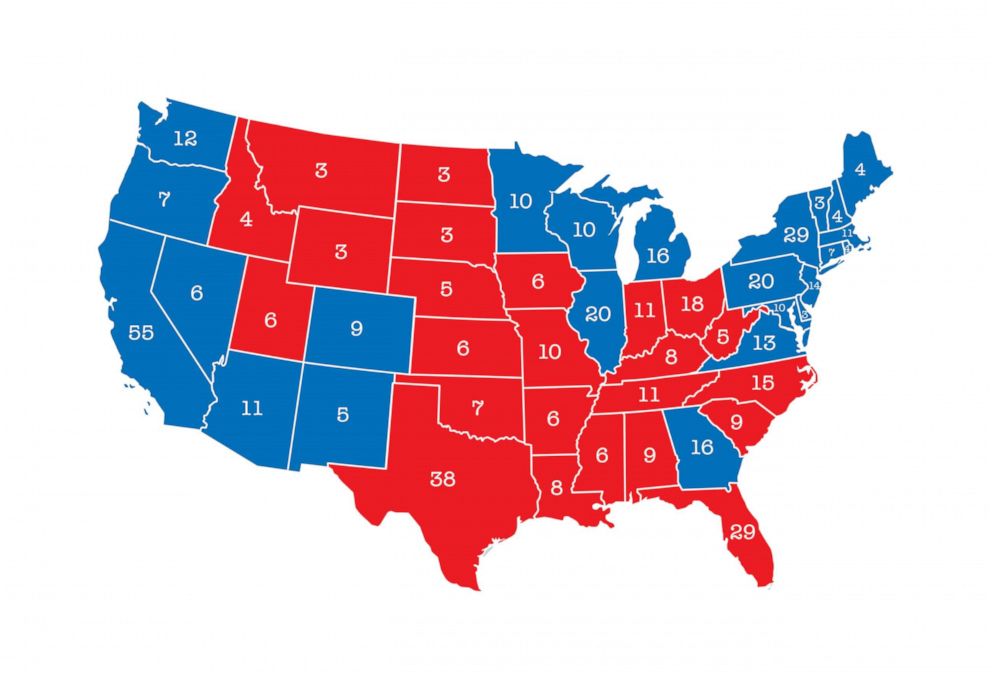Most of those states 16 plus DC nonetheless do not provide for any penalty or any mechanism to prevent the deviant vote from counting as cast. The winner-take-all method of choosing presidential electors was never.
 The Electoral College Meets On Monday Here S What To Expect Abc News
The Electoral College Meets On Monday Here S What To Expect Abc News
Bernie Sanders and in Texas two Republican electors voted for Ohio Gov.

Which states require electors to vote with popular vote. Some States however require electors to cast their votes according to the popular vote. 9 2020 824 PM UTC Updated Nov. Washington RCW 2971020RCW 29A56340 provides electors shall convene on December 19 2016 at.
Supreme Court which ruled in favor of states right to outlaw faithless electors. The ruling just under four months before the 2020 election leaves in place laws in 32 states and the District of Columbia that bind electors. In 48 of the 50 states state laws mandate the winner of the plurality of its statewide popular vote shall receive all of that states electors.
Colorado is the latest state to pass legislation to allot the votes though the pact wont take effect until enough states. Today 48 states all except Maine and Nebraska have a so-called winner-take-all law that awards all of a states electors to the presidential candidate who gets the most popular votes inside each separate state. Virginia law requires its electors to vote for the presidential and vice presidential candidate who won the popular vote in the state.
These winner-take-all laws are state lawsthey are not part of the US. Colorado became the latest state to join the National Popular Vote Interstate Compact now one of 15 states and DC. Have laws which mandate electors vote according to their state or Districts popular vote.
10 2020 307 PM UTC By Elliott Ramos. These laws were recently challenged before the US. This means their electors are bound by state law andor by state or party pledge to cast their vote for the candidate that wins the statewide popular vote.
Arkansas Georgia Idaho Illinois Kansas Kentucky Louisiana Missouri New Hampshire New Jersey New York North Dakota Pennsylvania Rhode Island South Dakota Texas West Virginia. The ruling just under four months before the 2020 election leaves in place laws in 32 states and the District of Columbia that bind electors to. States can require Electoral College voters to back the victor of their states popular vote the Supreme Court ruled unanimously on Monday.
In Maine and Nebraska two electors are assigned in this manner while the remaining electors are allocated based on the plurality of votes in each of their congressional districts. The ruling just under four months before the 2020 election leaves in place laws in 32 states and the District of Columbia that bind their share of. There are 33 states plus the District of Columbia that require electors to vote for a pledged candidate.
Fifteen states and the District of Columbia have joined the National Popular Vote Interstate Compact an agreement to award all Electoral College votes to whichever presidential candidate wins the overall popular vote in the 50 states and DC reports NBC. The ruling in cases in Washington state and Colorado just under four months before the 2020 election leaves in place laws in 32 states and the District of Columbia that bind electors to vote for the popular-vote winner as electors almost always do anyway. As of 2020 there are 17 states that do not legally require their electors to vote in accordance with the states popular vote.
In Hawaii a Democratic elector voted for Vermont Sen. There is no federal law that requires electors to vote as they have pledged but 29 states and the District of Columbia have legal control over how their electors vote in the Electoral College. 33 states and DC.
There is no Constitutional provision or Federal law that requires electors to vote according to the results of the popular vote in their States. By Rachel Bucchino L The Supreme Court on Monday upheld state laws requiring Electoral College representatives to support their states popular winner in presidential elections. The ruling just under four months before the 2020 election leaves in place laws in 32 states and the District of Columbia that bind electors.
